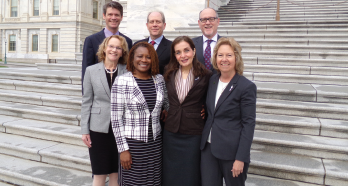
Back row from left: Angus Worthing, MD, David Karp, MD, PhD, Ken Saag, MD, MSc; Front row from left: Abby Abelson, MD, Hazel Breland, PhD, OT, FAOTA, Paula Marchetta, MD, MBA, Janet Poole, PhD, OT, FAOTA
We have often heard it said that opportunity arises from challenges. Challenge, of course, is really just a polite way of saying problem—and for our patients, problems abound when it comes to obtaining timely and affordable access to the rheumatologic care they need.
Access in this context has many meanings: There is access to life-changing treatments, which can be delayed or denied due to the need for prior authorizations, pre-approvals or step therapy. There is access that is unsustainable or untenable because of astronomical co-pays for non-formulary or less-preferred drugs—or no coverage at all for some medications. There is access that is temporally constrained because of the administrative burdens imposed on providers whose time and attention are taken away from patient care to deal with many non-clinical tasks. And there is access that is geographically constricted due to a growing workforce shortage, with so many areas of our country underserved or unserved by rheumatologists and members of the inter-professional rheumatology team.
These problems are not just our patients’ problems; they are problems for all of us in rheumatology. We know them well. We face them every day in the clinic. But what we may not know so well is that the ACR, through its advocacy work, has given us the opportunity to make a difference and lead the effort to expand access to care for our patients. As an ACR volunteer, I have seen the difference our advocacy work has made over the years, although new problems (challenges) always seem to pop up, much like a game of Whac-A-Mole.
Our work in advocacy at the ACR is geared to build access—not just our patients’ access to care and treatment, but our own access as rheumatologists and members of the inter-professional team to the lawmakers and policy makers who shape our working world and have the power to make changes that address these threats to patient access.
Let me share some examples of our advocacy efforts, along with some ways in which each of us can make a difference with our involvement.
Access to the Federal Policy Process
Congressional advocacy—The ACR opens the door for us to gain access to federal lawmakers to discuss the issues we see in our practices on a daily basis. Twice a year, in May and September, we host meetings in Washington, D.C., during which the ACR arranges for us to have face-to-face conversations with key staffers from the offices of our own senators and House representatives, with the purpose of asking them to support or sponsor legislation to help our patients and facilitate our provision of their care.
This May, members of our Board of Directors, ACR committees and leaders of state rheumatology societies converged on our nation’s capital for a series of meetings with lawmakers and staff. At these meetings, we discussed the critical need for reforms to address:
- The deleterious imposition of step therapy protocols;
- The burdensome and unnecessary requirements for obtaining prior authorizations and pre-approvals for indicated treatments;
- The rheumatology workforce shortage and its growing impact on access to care for our patients;
- The need to address the meager reimbursement for dual-energy X-ray absorptiometry (DXA), which diminishes access to osteoporosis screening, because so many testing sites have been forced to close; and
- The urgent need for more research funding, especially through the U.S. Department of Defense, because arthritis is the leading cause of disability and discharge among servicemen and women.
Come this September, the ACR will offer our general membership and patients the opportunity to go to Capitol Hill with our volunteer leaders as part of the ACR’s Advocates for Arthritis Fly-In. The applications to join us Sept. 8–10 are now available.
For those who prefer to meet federal legislators on our home turf or would like to continue to build relationships with senators and House representatives after the D.C. meetings, the ACR can facilitate access to federal lawmakers locally, either through district meetings or at fundraising events through RheumPAC (see below). It is also possible to invite a legislator to visit your practice. This is one of the best ways for officials to get a feel for the care we, as rheumatologists and members of the interprofessional team, provide our patients. They can see firsthand the impact we have on our patients’ quality of life, as well as the challenges our patients and we, as their providers, face every day.
The ACR also provides our members with a vehicle for year-round direct access to Congress through the Legislative Action Center. Here, we can directly write to our lawmakers. Precomposed, editable messages on a range of issues facing rheumatology practices and patients are available for us to consider sending. In addition, the ACR’s professional advocacy staff communicates year-round directly with Hill offices and staff on the priority issues of the rheumatology community. We can influence legislation and advance key bills due to these ongoing contacts and relationships.
Access to Decision Makers & Rheumatology Champions
RheumPAC—One of the most effective ways the rheumatology community can make a difference and increase access is through the ACR’s Political Action Committee for Rheumatology: RheumPAC. Donations to RheumPAC (or perhaps better said, investments in RheumPAC) from ACR and ARP members allow us to give financial support to the campaigns of rheumatology champions in Congress. These legislators feel they have the backing of the membership through RheumPAC, and this, in turn, gives additional access to these members of Congress through fundraising events or by their coming to present to us at ACR Advocacy meetings.
RheumPAC contributions, made possible through our investments in RheumPAC, help preserve the seats of our champions in Congress. These champions fight for us on issues important to rheumatology; they let us know when bills relevant to rheumatology are coming up, and they introduce new bills to address our issues. Learn more at RheumPAC.
The ACR also participates in advocacy events with other medical specialties. These meetings allow targeted conversations on topics of interest we share with other cognitive specialties, such as workforce shortages and the onus of prior authorizations. These informal settings allow for updates on politics and caucus discussions surrounding greater healthcare themes, including the various Medicare-for-All bills or rural legislators’ conversations about access to care in their states.
Access to Rule Makers
Regulatory advocacy—After laws are passed, many of the details that will have an impact on the rheumatology community are decided in rulemaking. At the federal level, for healthcare issues, this rulemaking occurs within the U.S. Department of Health and Human Services (HHS), in particular the Centers for Medicare & Medicaid Services (CMS), as well as the U.S. Food and Drug Administration (FDA) and other HHS agencies. The ACR has a professional team on staff who directly communicates on our behalf with regulators at these agencies.
The team not only submits formal comments on proposals, such as CMS-proposed changes to the payment structure of evaluation and management (E/M) codes or Part B drug delivery and payment, but also meets with staff and top officials at HHS and its agencies, including HHS Secretary Alex M. Azar.
Last year the ACR led a campaign that successfully stopped the CMS from collapsing E/M codes, with resultant payment cuts; these cuts would have hit cognitive specialties, such as ours, particularly hard. The ACR and its partners were also successful in stopping major cuts to Part B drug reimbursements. These efforts are all driven by the corps of dedicated volunteers from our Government Affairs Committee (GAC) and Committee on Rheumatologic Care (CORC), along with others.
The opportunity to join this effort is open to any of us willing to become more involved as an ACR volunteer on these committees.
For our patients, problems abound when it comes to obtaining timely & affordable access to the rheumatologic care they need.
Access at Home
State advocacy—Of course, it is not only federal policy that has an impact on our practices and our patients’ access to care. Many issues—in particular insurance requirements or sanctions, such as step therapy and non-medical switching of prescribed treatments—are primarily handled at the state government level. Through our professional staff, the ACR monitors these activities and gets involved in issues and legislative action in all 50 states and Puerto Rico.
We provide members access to ACR resources and updates at state meetings. We also send specific alerts to members when legislation is moving in their states. Thus, on the state level, there is also great opportunity for us to make a difference, especially by contacting state legislators or governors. The ACR can also facilitate meetings for our members with their representatives in their state capitals.
Additionally, one of the best ways to make a difference is through involvement in our state or local rheumatology societies. Through the efforts of these state and local rheumatology societies, the rheumatology community is making a difference and increasing access to care in many states. So far, 22 states have passed laws that provide exemptions and other patient protections to step therapy. And there are many more such state laws in the works!
Call to Action
If opportunities are born from challenges, then our opportunities to improve patient access to rheumatologic care are overwhelmingly abundant. But to loosely quote Thomas Edison: Opportunities are missed because they are dressed in overalls and look like work. From my own experience, I can say the work of advocacy is absolutely worth the investment of time and effort. And of course, to quote again—many hands make light work.
I encourage every member of the ACR and ARP to become involved in the advocacy efforts of the ACR to help lighten the burden for our patients and for all of us who look after them. Each of us can truly make a difference.
 Paula Marchetta, MD, MBA, is a rheumatologist in New York City and the CEO and managing partner of Concorde Medical Group, a multi-specialty private group practice affiliated with NYU Langone Health. She teaches at NYU School of Medicine, where she is a clinical professor. Dr. Marchetta is the 82nd ACR president.
Paula Marchetta, MD, MBA, is a rheumatologist in New York City and the CEO and managing partner of Concorde Medical Group, a multi-specialty private group practice affiliated with NYU Langone Health. She teaches at NYU School of Medicine, where she is a clinical professor. Dr. Marchetta is the 82nd ACR president.
FullbarRheumPAC Launches Access 2020 Campaign
You can make a big difference for rheumatology access, especially if you have never given to RheumPAC before. Pledge just $20 for the x2020 campaign cycle as part of the Access 2020 campaign. Learn more about the campaign and benefits at MyAccess2020.org.